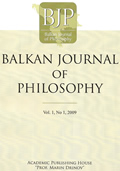Republicanism: A New Political Philosophy?
Republicanism: A New Political Philosophy?
Author(s): Cristian-Ion PopaSubject(s): Philosophy
Published by: Институт по философия и социология при БАН
Keywords: republicanism; liberalism; social democracy; non-domination; non-interference; social protection.
Summary/Abstract: This article examines some aspects of current republican philosophy, starting from its central idea of human freedom—freedom as non-domination—then describes in general terms its political agenda, attempting therein to undertake a critical analysis of its position in relation to the prevalent political philosophies of our time—liberalism and social democracy. Current republicanism is a school of thought cultivated by philosophers and historians of ideas such as Philip Pettit, Quentin Skinner, Frank Lovett, John Maynor, and others who—drawing on the classical republican tradition from Cicero to James Madison—propose a new political philosophy as a way to establish and legitimate some general, “ecumenical” positions on the major policy issues of contemporary societies. At its core, the central objective of this political philosophy is to rethink almost all substantial issues of legitimacy and democracy, welfare and social justice, public policy and constitutional design from within the conceptual framework that its central idea of liberty as non-domination provides. Formally, republicans aspire to articulate a universal language, a political lingua franca in which all individuals and social groups are able to have a voice in the current and ardent political debates, especially in order to express their diverse “complaints” or “grievances.” For unless different individuals and groups can find a common language in which to talk about their problems, the complaints of each group are nothing but noise in the ears of the others; in effect, they would have the status, and the (in)significance, of inarticulate mewlings. The paper will argue that republicanism, consistent with its (overly) “ecumenical” propensity, risks overshadowing its sui generis existence by being insufficiently different from Socialism, as well as by its exaggerated insistence on providing a comprehensive alternative to Liberalism.
Journal: Balkan Journal of Philosophy
- Issue Year: VII/2015
- Issue No: 2
- Page Range: 169-176
- Page Count: 8

